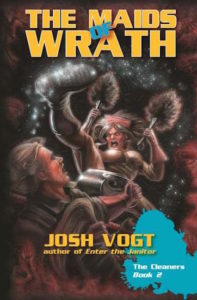I’ve always been fascinated by the juxtaposition of humor and horror in our psyches. The two seem oddly linked, both contrasting with and yet complementing one another in the experiences we have and the stories we tell. A saying (I’m unsure of the origins and will probably bungle my attempt at summarizing) that has stuck in my head for years is: “When we’re frightened or horrified, we have two choices—to scream or to laugh.”
Why are they so linked, though? Why do we try to find humor in horrific situations?
 I write an urban fantasy series called The Cleaners, which focuses on the somewhat absurd adventures of magically empowered janitors, maids, and plumbers who work for a supernatural sanitation company. The series begins with Enter the Janitor and The Maids of Wrath, with the third, The Dustpan Cometh, arriving sometime in the next year. Throughout the stories, the Cleaners deal with all sorts of strange situations, such as tromping through mystic sewers, facing down garbage golems in city dumps, or encountering fiendish dust devils in public restrooms. I tend to play up the humorous side of the stories as much as I can, enjoying the ridiculousness of what some might think of as modern-day wizards, mages, and witches taking down the forces of Corruption with mops, spray bottles, squeegees, and toilet paper.
I write an urban fantasy series called The Cleaners, which focuses on the somewhat absurd adventures of magically empowered janitors, maids, and plumbers who work for a supernatural sanitation company. The series begins with Enter the Janitor and The Maids of Wrath, with the third, The Dustpan Cometh, arriving sometime in the next year. Throughout the stories, the Cleaners deal with all sorts of strange situations, such as tromping through mystic sewers, facing down garbage golems in city dumps, or encountering fiendish dust devils in public restrooms. I tend to play up the humorous side of the stories as much as I can, enjoying the ridiculousness of what some might think of as modern-day wizards, mages, and witches taking down the forces of Corruption with mops, spray bottles, squeegees, and toilet paper.
Yet even as there’s plenty of opportunity to laugh or chuckle in the Cleaners novels, there are also plenty of times along the way where the situations they encounter can be truly horrific. People die—oftentimes in rather nasty ways. Creatures lurch and shamble about with all manner of slavering maws and grasping claws or tentacles that would leave a person searching for a clean pair of pants if just glimpsed in real life. There’s supernatural rot that can eat you from the inside-out, beings that embody decay and depravity, and no small amount of insanity-shattered minds that perceive reality through twisted perspectives.
And I have found that by bringing elements of both humor and horror into the series, it has grown stronger. Funny moments stand out more…as do their darker counterparts. Why is that?
I think a big part of it comes down to how we choose to build and release tension within ourselves. One of a writer’s jobs is to create conflict and tension within a story—to generate a growing pressure, whether between one character and another, a character and a monster, or just through the ambience of a particular scene. Yet that tension has to be released at some point. There needs to be a chance for characters (and the reader) to take a breath and gather themselves for what comes next. And humor—be it a side joke, a bit of witty banter, a wry observation of the irony of a situation, or a bout of good old slapstick—provides a readily available “pressure release valve” within a story’s narrative. On the flipside, if all is levity without any sense of consequence or the potential for awful things to occur, then that makes it difficult to get a reader to feel invested in a character or plot.
At the same time, we find solace and safety by employing humor in the face of the horrific. It shields us. It gives us the mental and emotional space we need to process or handle a terrifying or otherwise horrible situation without being overwhelmed and breaking down. And when we can point and laugh at a monstrous threat—even for the slightest reason—it gives us a measure of power over that threat and helps us feel like we still have a measure of control (whether that’s true or not is up for debate). Without even a small smile or soft laugh to break up a string of terrible events, characters and readers alike can become bogged down by relentless dread or dismay.
In another sense, humor and horror “season” one another. It’s like adding contrasting spices to a dish you’re cooking…sweetness can heighten the enjoyment of saltiness, and vice versa. Spiciness can increase our awareness and appreciation of smoother flavors. Humor or horror in-and-of-themselves can certainly be compelling, but when they are experienced together to varying degrees, we can come to see the effects of both all the more.
Now, you may be a writer who prefers to craft primarily horror-oriented stories, or you may be one who leans heavily toward humor. Either is fine, and there are plenty of readers who prefer genres favoring one more than the other. But don’t let yourself be limited by thinking horror and humor can’t coexist, or even enrich one another. If you’ve worked primarily within one of these emotional spectrums, try intersecting them at different points and see if the results don’t turn out better than you expected.
Bring in some laughs to occasionally drown out the screams. Of course, I’ll let you decide whether those laughs come from characters finding the strength to stand in the midst of terror…or from the evil clown chasing them down in the dead of night.
About the Author:
 Author and editor Josh Vogt’s work covers fantasy, science fiction, horror, humor, pulp, and more. His debut fantasy novel, Pathfinder Tales: Forge of Ashes, was published alongside his urban fantasy series, The Cleaners, with Enter the Janitor and The Maids of Wrath. He’s an editor at Paizo, a Scribe Award and Compton Crook Award finalist, and a member of both SFWA and the International Association of Media Tie-In Writers. Find him at JRVogt.com or on Twitter @JRVogt.
Author and editor Josh Vogt’s work covers fantasy, science fiction, horror, humor, pulp, and more. His debut fantasy novel, Pathfinder Tales: Forge of Ashes, was published alongside his urban fantasy series, The Cleaners, with Enter the Janitor and The Maids of Wrath. He’s an editor at Paizo, a Scribe Award and Compton Crook Award finalist, and a member of both SFWA and the International Association of Media Tie-In Writers. Find him at JRVogt.com or on Twitter @JRVogt.